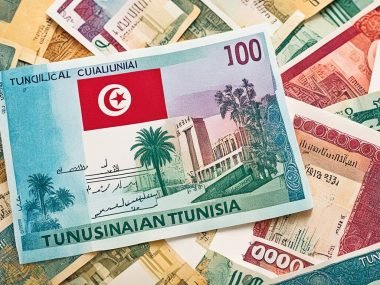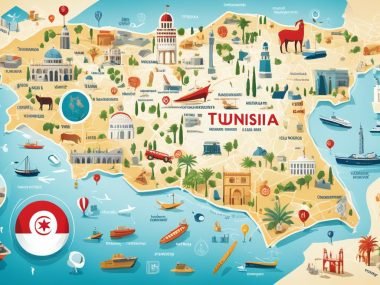Did you know Tunisia brings in about 60% of its grain from other places each year? This shows how the country depends on outside sources for food. It is both interesting and a bit worrying. Tunisia’s food is a big part of its culture. But it needs to get a lot from other countries. This mix of local farming and imports fulfills the needs of its people.
Tunisia is trying to make more food itself and keep its food ways going strong. But, many things affect this effort. These include money issues, trade deals, and the weather. Looking into Tunisia’s food, it’s clear they use both local and foreign food. Money problems and the world’s supply chain issues add to the challenge.
Key Takeaways
- Tunisia imports approximately 60% of its grain requirements.
- The Tunisian food supply chain balances both local agricultural production and imports.
- Culinary sustainability in Tunisia is influenced by economic, trade, and climatic factors.
- Local efforts are ongoing to enhance production capacities.
- Economic challenges and global market dependencies impact food security.
Overview of Tunisian Food Sources
Tunisia combines local farming and imports for food. It grows many crops because of its diverse lands. Still, the country needs to import food for its people.
Local Agricultural Production
Farming is very important in Tunisia. It grows things like cereals, olive oil, and dates. The good weather helps to grow lots of fruits and vegetables.
The government helps farmers grow more food. This shows how important farming is to the country.
Food Imports
Tunisia also buys food from other countries. It imports essentials like wheat, vegetable oils, and grains. These foods are important for Tunisian meals.
Importing food makes sure everyone has enough to eat. It mixes global buying with local farming. This helps keep food steady in Tunisia.
The Role of Agriculture in Tunisia
The agricultural sector is key in Tunisia’s economy. It overcomes challenges and is vital for the Tunisian food economy. It helps a lot with jobs and growing the economy.
Economic Contribution of Agriculture
Agriculture is the backbone of Tunisia’s economy. It ensures food security and aids economic stability. The sector adds to GDP growth, with more large farms starting. This shows a big change in the industry.
Employment in the Agricultural Lot
A lot of Tunisians work in agriculture. It supports many rural families. With modern farming, there are more jobs. This makes agriculture even more crucial to the Tunisian food economy.
Regulations and Market Controls
Agricultural regulations in Tunisia are shaped by the Ministry of Agriculture. These rules influence the market and how agriculture grows. They’re important for product quality and safety, even though they can slow growth sometimes.
Leading Agricultural Imports
Tunisia depends a lot on agricultural imports. These are important for the nation’s food and economy. Wheat and grain imports, vegetable oil imports in Tunisia, and corn importation are very important. They show how changes in the world can affect Tunisia.
Wheat and Grain
Imports of wheat and grain are crucial in Tunisia. People eat a lot of bread and couscous. Most of their wheat comes from other countries. This makes the cost of wheat very important for Tunisia.
Vegetable Oils
Tunisia needs more and more vegetable oil. Olive oil is a favourite, but other imported oils are needed too. These oils are cheaper. But this means Tunisia depends on the world market.
Corn and Barley
Corn imports are vital for Tunisia. Corn helps feed animals like poultry and cattle. Barley is also important. These imports connect Tunisia’s farms to global markets.
| Commodity | Primary Use | Primary Source Countries |
|---|---|---|
| Wheat and Grain | Staple Food (Bread, Couscous) | France, Italy |
| Vegetable Oils | Cooking and Culinary Uses | Ukraine, Argentina |
| Corn | Livestock Feed | United States, Brazil |
| Barley | Brewing, Animal Feed | Russia, Germany |
The Food-Processing Sector
The food-processing industry is vital in Tunisia. It has many businesses working at local and international levels. The sector is alive and growing.

Major Enterprises
Big companies like Société Tunisienne des Industries Alimentaires and Poulina Group Holding lead the way. They use new tech and high standards. This means their goods meet world levels.
Export-Oriented Production
A lot of Tunisia’s food industry focuses on exports. They work closely with European and Middle Eastern markets. Their items, like olive oil and canned sardines, bring in money from abroad. This also makes Tunisia known for quality food.
Growth of Processed Food Consumption
Lately, more people in Tunisia eat processed food. City folks want quick meals. This shows how habits and diets are changing.
Supermarkets in Tunisia now offer a wide mix of products. From frozen meals to sauces, the choice grows. This highlights changing tastes and the industry’s ability to adapt.
The Impact of Imports on Tunisian Food Supply
Tunisia’s food scene heavily depends on the global market. It needs imports for many basic food items, like grains. This shows how world trade and deals affect what Tunisians eat.
Global Supply Chain Dependence
Tunisia gets benefits but also faces risks from its reliance on global trade. It means access to important food products. Yet, this also exposes Tunisia to price changes and shortages. Events like global crises or health scares can disrupt this balance.
Influence of International Trade Agreements
Trade deals greatly affect Tunisia’s food imports. They can make trade easier, cut costs, and smooth the way for imports. But, they can also create hard ties that might be a problem during hard times. Deals with places like the European Union are key for getting goods. But, they also commit Tunisia to certain rules.
L>
Challenges of Food Security in Tunisia
Tunisia faces food security threats due to climate change and economic issues. These problems make it hard to keep a steady and sustainable food supply. They also affect everything from farming to living costs. Let’s explore these important issues.
Climate change and Its Effects
Climate change is making Tunisia’s weather hotter and rain patterns unpredictable. This hurts farming schedules, lowers crops, and causes less water for fields. To fight these effects, Tunisia needs to change how it farms. But, knowing the best steps to take is hard and needs quick action.
Climate change also affects animals due to heat and less water. This makes food security worse in Tunisia. These problems make food more expensive. So, it gets tougher for people to buy what they need.
Economic Instability
Economic troubles add to Tunisia’s food security problems. Issues like political unrest and global market changes make funding for farming unpredictable. This makes it difficult to plan for the future and update farming practices.
Also, economic instability can increase unemployment. This reduces how much money people have. So, many struggle to buy food. This might mean relying more on imported food, which costs more. Solving these economic issues is key to a strong food system in Tunisia.
Tunisia’s Food Supply Chain
Tunisia’s food supply chain is key for steady access to food. This chain’s mechanics affect food prices, availability, and security.
Logistics and Distribution
Good supply chain logistics ensure goods move smoothly from producers to consumers. In Tunisia, it starts with getting raw materials locally. Then it goes through storage and ends with the final delivery. Good transport networks and infrastructure help avoid delays. Tunisia is working to make these logistics better for constant food supply.
Rules and policies play a big part in logistics. Easier border checks and better cold storage reduce food spoilage. Paying attention to logistics makes Tunisia’s food supply chain more reliable. It brings market stability.
Market Dynamics
The Tunisian market dynamics mix local and global effects. This mix affects food supply and what people buy. Tunisia’s farms face changing world market conditions. They balance imports with growing more food at home. How logistics and market forces interact affects food prices and availability.
Consumer tastes in Tunisia are changing. More people want healthy and organic foods. This shift makes suppliers change what they offer. The food supply chain needs to quickly adapt to these changes.
Domestic Production and Its Limitations
Food production in Tunisia is essential for the nation’s food needs. Yet, it faces big challenges. These challenges result in a gap that imports fill. This shows Tunisia’s big reliance on imports.

Reliance on Foreign Imports
Tunisia makes food like olive oil, dates, and citrus fruits. But, it struggles with wheat and dairy. The country’s weather and economic issues add to these problems. This makes the reliance on imports very clear.
Below is a comparison of Tunisia’s imports and local food production:
| Food Item | Domestic Production | Imported |
|---|---|---|
| Wheat | 30% | 70% |
| Dairy Products | 40% | 60% |
| Vegetable Oils | 50% | 50% |
| Corn and Barley | 35% | 65% |
In short, Tunisia’s need for imports is because of its production challenges. This reliance is a big challenge for the country’s food security.
The Influence of the European Union
The European Union helps Tunisia a lot, especially with farming. History and geography make their relationship strong. This influences trade, economics, and rules.
One big area is EU-Tunisia agricultural relations. They make deals to trade farm goods. This helps Tunisia’s economy. Farmers follow EU rules to sell their goods in Europe. This makes their products better.
These deals also mean Europeans get good food from Tunisia. It’s good for both sides and makes trade strong. The EU also helps with money and advice for farming in Tunisia.
There are many training programs and workshops from the EU. This makes farming in Tunisia better. Farmers get more crops and can sell more. This helps Tunisia’s economy grow.
So, EU-Tunisia agricultural relations are very important. They help both the EU and Tunisia. The farming in Tunisia gets better, making its place in the world market stronger. This helps them develop sustainable agriculture.
Recent Developments and Policy Changes
Tunisia has made big changes in its policies. They aim to deal with food price issues. New rules have been set to fight price hikes and ensure stable prices.
The country is working on many reforms for better food supply and sustainability. These measures are vital. They affect living costs and economic growth.
Below, I’ve listed some important changes and what they might mean:
| Policy Change | Objective | Expected Impact |
|---|---|---|
| Anti-Speculation Laws | Reduce food price volatility | Stabilise market prices |
| Subsidy Reforms | Optimise resource allocation | Improve economic efficiency |
| Import Tariff Adjustments | Encourage local production | Boost domestic agriculture |
| Incentives for Farmers | Increase food production | Enhance food security |
Tunisia’s policy changes and economic developments are promising for the future. But, everyone must keep an eye on these reforms. The government is working hard to ensure the economy stays strong.
Opportunities in Tunisian Agribusiness
Tunisia’s agriculture is changing, offering new agribusiness investment opportunities. It attracts both local and international investors. Its great location and rich natural resources make it perfect for new business ventures.
Investment Incentives
The government knows the value of agriculture in Tunisia and gives incentives to investors. These benefits include tax cuts and simpler rules, making it easy for businesses to grow. This is all to help agribusinesses thrive.
Emerging Market Segments
There are new markets in Tunisia that offer chances to grow and innovate. Areas like organic farming, using less to do more, and better watering methods are key. Putting money into these fields is not only smart but also good for Tunisia’s farming future.
| Market Segment | Investment Potential |
|---|---|
| Organic Farming | High due to rising global demand |
| Sustainable Practices | Moderate with long-term benefits |
| Advanced Irrigation Systems | Significant for improving water efficiency |
Conclusion
Tunisia’s food future depends on balancing local farming and important imports. Its farm sectors are tough but face big issues. These need solving for a lasting food supply.
Climate and money troubles are big problems. Tunisia can beat these by investing in farms and new markets. Good policies and putting them into action are key.
Food stability in Tunisia needs more than farm changes. It’s about money safety and dealing with climate too. Everyone must work together to keep Tunisia’s food secure. This will help its people and economy for a long time.
Source Links
- https://wits.worldbank.org/CountryProfile/en/Country/TUN/Year/LTST/TradeFlow/Import/Partner/by-country/Product/16-24_FoodProd – Tunisia Food Products Imports by country 2021
- https://www.trade.gov/country-commercial-guides/tunisia-agricultural-sectors – Tunisia – Agricultural Sectors
- https://www.mei.edu/publications/tunisias-food-shortages-shine-spotlight-its-core-economic-failings – Tunisia’s food shortages shine a spotlight on its core economic failings







